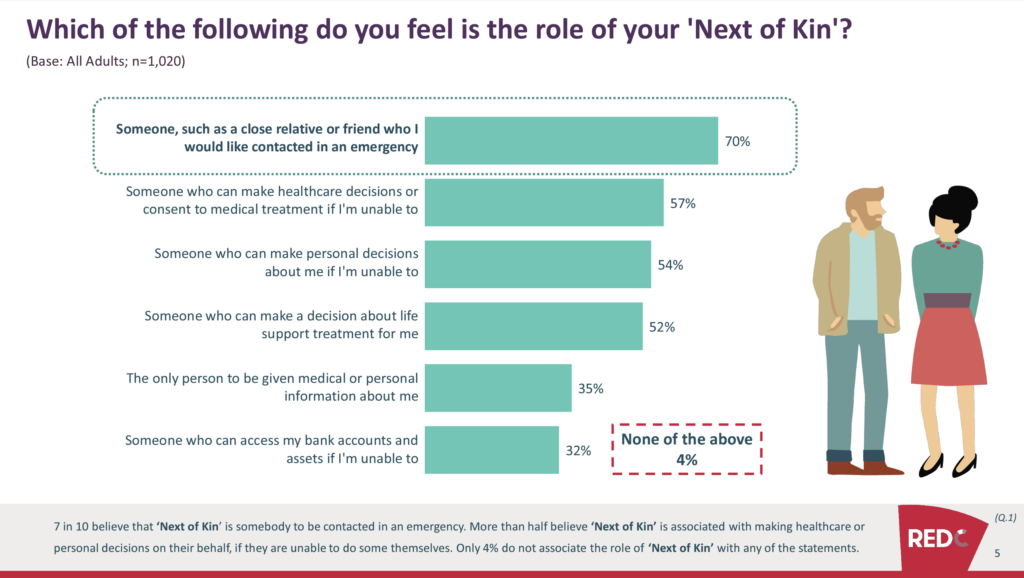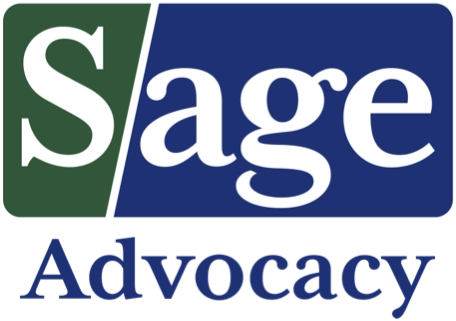Next of Kin
Next of Kin – A Popular Myth
‘Next of Kin’ simply means someone who you would like contacted in an emergency. Being a ‘Next of Kin’ provides no legal standing whatsoever despite widespread belief to the contrary; beliefs held by some health and social care professionals as well as the general public.
In a nationwide Red C public opinion survey in January 2018 70% of people answered, correctly, that ‘Next of Kin’ is “Someone, such as a close relative or friend, who I would like contacted in an emergency”. However, 57% of people believed that’ Next of Kin’ was “Someone who can make healthcare decisions about me if I’m unable to”; 54% believed it was “Someone who can make personal decisions about me if I’m unable to”; 52% believed it was “Someone who can make a decision about life support treatment for me”; 35% believed that ‘Next of Kin’ was “The only person to be given medical or personal information about me”. Some 32% believed that ‘Next of Kin’ was someone who can access my bank accounts and assets if I’m unable to”.

It is vital, amid continuing service pressures that frontline health and social care staff do not face having their time wasted by pointless arguments among family members about ‘Next of Kin’. It is also important that hospital staff establish who you want as your designated contact person NOW as opposed to insisting that someone who you listed as your ‘Next of Kin’ some years ago should remain as your designated person. In some cases this could mean an abusing family member.
To safeguard yourself in a healthcare situation it is advisable to state clearly:
The name of an Emergency Contact / Designated Person who you would like contacted in the event of an emergency, serious illness or death.
Who you would like information about your medical condition to be shared with.
Being clear on these two things and insisting that your wishes be so recorded can help minimise confusion, family tensions and wasting the time of overstretched health and social care professionals.
Sage Advocacy supports the current campaign of Safeguarding Ireland to Plan Ahead and urges everyone to consider Enduring Power of Attorney, Advance Healthcare Directives and Think Ahead, www.thinkahead.ie a resource of the Irish Hospice Foundation that assists people to plan and record their wishes in the event of emergency, sudden illness or death.
The Information & Support Service of Sage Advocacy can assist you if you have any queries. Call 01 536 7330.
LISTEN TO OUR RADIO AD
Sage Advocacy Red C Poll on ‘Next Of Kin’
A survey commissioned by Sage Advocacy in January 2018 revealed widespread and serious misunderstanding about the meaning of the term “Next of Kin”.
An online Red C poll showed that 52% of those questioned believed, wrongly, that anyone named as “Next of Kin” can make healthcare or other major decisions on another person’s behalf. In fact being named as “Next of Kin” only means that that person should be contacted in the event of an emergency. This misunderstanding is a serious issue for anyone undergoing medical care, and especially for vulnerable adults and older people. It is also a vital issue for their relatives, friends or anyone directly concerned about their well-being.
Sage Advocacy commissioned the survey arising from our work on nursing home contracts in 2017 which identified problems with residents’ contracts being signed inappropriately by ‘Next-of-Kin’, sometimes when the person about to enter a nursing home had the capacity to decide for themselves.
Read Sage Advocacy’s discussion document on nursing home contracts of care that raised an alarm on next of kin.
Scroll down to learn more about the role of ‘next of kin’.

Next of Kin a confusing term? Make sure you have a ‘Designated Person’, says Valerie Cox
In this 60-second video, Valerie Cox explains how to avoid confusion & family tensions in a healthcare emergency.
Sage Advocacy continues to be available for vulnerable people who need support. Call Information & Support: 01 536 7330 or email info@sageadvocacy.ie

The role of ‘Next of Kin’
‘Next of kin’ in not a legal term. It is used in medical or healthcare settings to indicate a contact person, the person to be contacted in the event that something happens, such as an accident, illness or decline in a person’s condition. This is often a relative or friend.
The ‘Next of kin’ does not have any legal authority or responsibility to make decisions or give consent on behalf of a person, unless they have been legally appointed to do so under a registered Enduring Power of Attorney.
A person who is a relative or friend, can make a valuable contribution by providing relevant information in respect of a person at a time when that person, either temporarily or otherwise, is not able to provide it for themselves. Close relatives or friends can give information to ensure the person’s past will and preferences, and their beliefs and values are known, which will help to determine what the person would decide for themselves in a particular situation if they were able to do so.
Under the Assisted Decision-Making (Capacity) Act 2015 a person can legally appoint a person they choose to help them make decisions, or to make decisions with them when they need assistance, or to make decisions on their behalf in the future when they are no longer able to do this. This person may be a relative or friend. A relative or friend may also be appointed by the Court as a person’s Decision-Making Representative. A person who is appointed to make decisions on a person’s behalf must adhere to the Guiding Principles of the ADM (Capacity) Act 2015 and base the decision on the known will, preferences, beliefs and values of the person who appointed them.
To give a familiar person authority to make decisions should serve to protect and safeguard a person’s own interests. It also gives that person significant responsibility, and it is therefore important that a person giving this authority has discussed with the person being appointed their wishes, preferences, values and what they would like that person to decide for them in the future should it become necessary.
